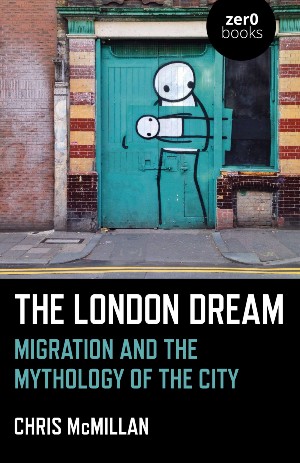
Chris McMillan knows the London Dream all too well, and his book shows how the city exploits labour whatever the form of capitalism it has hosted, finds Morgan Daniels

Arriving in the capital a decade ago from his native New Zealand, Chris McMillan expected to find steady employment. Instead, he survived for years through a precarious mix of bitty jobs that just about allowed him to pay the rent. Things were so desperate at one stage that he was tempted to take work as a guinea pig for flu medication (‘all I had to do was not move for a week’). McMillan’s story eventually had a happy ending: he now has both a permanent job and two young children, but as he explores in his timely and witty new book, London doesn’t work out quite so well for everyone.
The London Dream is concerned with the Big Smoke as a place of promise, a grand fantasy that has drawn in millions of migrants across the world and across the centuries. The backbone of McMillan’s research is a series of interviews with workers in a wide range of fields, each of whom has lived the dream in one form or another: a Swedish actor; an Austrian entrepreneur; an outsourced security guard from Nigeria. These contemporary case studies are complemented by a fine sweep through London’s history, going back to the settling of Londinium by the Romans.
McMillan is grounded throughout by Marx, in particular his insight into capitalism’s need for a ‘disposable industrial reserve army’: put otherwise, ‘a mass of human material always ready for exploitation’. Whether The London Dream is profiling an early career journalist, a copywriter, or a casualised academic, the story is usually the same: the jobs market in London is obscenely over-saturated, meaning that there will always be hundreds if not thousands of others ready to be exploited if you’re not. ‘Thus,’ writes McMillan, ‘those not being employed within a given field but still searching for work there have a vital economic function. By being excluded from industry and yet standing as potential workers, they compel employees to accept and endure conditions they are presented with’ (pp.214-15).
One of the most famous examples of the ‘reserve army’ in action in London was on the nineteenth-century docks, when only a third or so of labourers had permanent work. The rest would be up at the crack of dawn in places like Limehouse, prepared to physically fight one another for the hope of a day’s pay. Though we might find such a process ‘barbaric’ today, observes McMillan, the ‘logic of the Victorian docks’ persists in a particularly pronounced way in the gig economy, in the basement-level exploitation of Uber and Deliveroo drivers. The London Dream suggests one big difference between then and now:
‘Although twenty-first century sweated labour has become cleaner, no Victorian employer would try to sell the benefits of insecure work. London’s gig economy companies have less shame, instead promoting the benefits of flexibility, freedom and control’ (p.236).
For me, this straight line between the docks of old and the immoral economy of Uber exemplifies the real value of The London Dream. Just as Marx took the bourgeois economists deadly seriously so as to debunk them, McMillan gives respect to more recent theories of social class with the effect of showing them to be neoliberal nonsense.
Especial attention is affordedto the work of the urbanist Richard Florida’s rigorous promotion of ‘the creative class’ as the motor of economic growth and (therefore) the modern city. Florida’s ideas have had a tremendous influence in the reimagining of whole areas of cities in a ‘cool’ register – street art, wacky open-plan offices, bullshit bars with ball pits, whatever – in the hope of attracting ‘creatives’. The stories that McMillan tells undercut such postmodern conceptions of class.
What I mean is that The London Dream ultimately reaffirms class as a social relation. This is an essential lesson. For all the talk of the gig economy or the creative class, for all the wrecking balls taken to the very notion of labour over the past forty years, class remains a question of one’s relationship to the means of production. Are you the exploiter or the exploited?
‘Capitalism can be cool’ writes McMillan. ‘Capitalism can be cold and brutal. It is still capitalism, whatever form it takes.’
Before you go
Counterfire is growing faster than ever before
We need to raise £20,000 as we are having to expand operations. We are moving to a bigger, better central office, upping our print run and distribution, buying a new printer, new computers and employing more staff.

